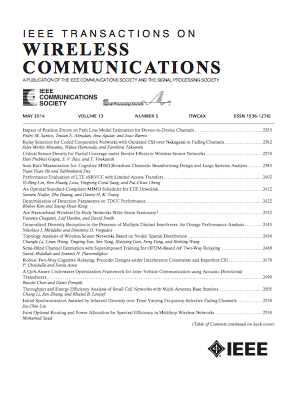通过无组合检测实现大规模索引调制系统
IF 10.7
1区 计算机科学
Q1 ENGINEERING, ELECTRICAL & ELECTRONIC
引用次数: 0
摘要
索引调制(IM)是超越第五代(B5G)和第六代(6G)无线系统的关键使能技术之一,它通过对信号传输过程中所利用的资源进行索引来传递信息,其固有的能量和频谱效率引起了人们的关注。然而,大规模IM的一个关键瓶颈是组合顺序的不可行的检测复杂度。因此,在本文中,为了最大限度地发挥IM在大型场景中的优势,我们提出了一种新的消息传递(MP)解码器,该解码器在高斯信念传播(GaBP)框架下设计,利用基于目的衍生的新颖概率分布的IM信号的新型单位向量分解(UVD)。该方法具有较低的解码复杂度,不受先前禁止的组合因素的影响,同时仍然接近基于不可行的最先进(SotA)搜索方法的性能。通过复杂性分析和典型的大规模(多达96个天线)的导航广义正交空间调制(GQSM)系统的数值结果证明了该方法的有效性。本文章由计算机程序翻译,如有差异,请以英文原文为准。
Enabling Massive Index Modulation Systems via Combinatorics-Free Detection
Index modulation (IM) is one of the key enabling technologies for beyond fifth generation (B5G) and sixth generation (6G) wireless systems, attracting attention for its inherent energy and spectral efficiency resulting from conveying information through the indexation of the resources utilized in during signal transmission. However, a remaining critical bottleneck for large-scale IM is the consequently infeasible detection complexity of combinatoric order. Therefore in this article, in order to maximally reap the advantages of IM in large scenarios, we propose a novel message passing (MP) decoder designed under the Gaussian belief propagation (GaBP) framework exploiting a novel unit vector decomposition (UVD) of IM signals with purpose-derived novel probability distributions. The proposed method enjoys a low decoding complexity that is independent of previously prohibitive combinatorial factors, while still approaching the performance of unfeasible state-of-the-art (SotA) searchbased methods. The effectiveness of the proposed approach is demonstrated via complexity analysis and numerical results for the exemplary piloted generalized quadrature spatial modulation (GQSM) systems of truly massive sizes (up to 96 antennas).
求助全文
通过发布文献求助,成功后即可免费获取论文全文。
去求助
来源期刊
CiteScore
18.60
自引率
10.60%
发文量
708
审稿时长
5.6 months
期刊介绍:
The IEEE Transactions on Wireless Communications is a prestigious publication that showcases cutting-edge advancements in wireless communications. It welcomes both theoretical and practical contributions in various areas. The scope of the Transactions encompasses a wide range of topics, including modulation and coding, detection and estimation, propagation and channel characterization, and diversity techniques. The journal also emphasizes the physical and link layer communication aspects of network architectures and protocols.
The journal is open to papers on specific topics or non-traditional topics related to specific application areas. This includes simulation tools and methodologies, orthogonal frequency division multiplexing, MIMO systems, and wireless over optical technologies.
Overall, the IEEE Transactions on Wireless Communications serves as a platform for high-quality manuscripts that push the boundaries of wireless communications and contribute to advancements in the field.

 求助内容:
求助内容: 应助结果提醒方式:
应助结果提醒方式:


